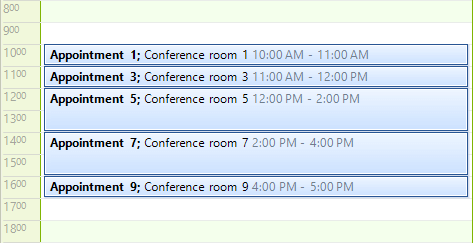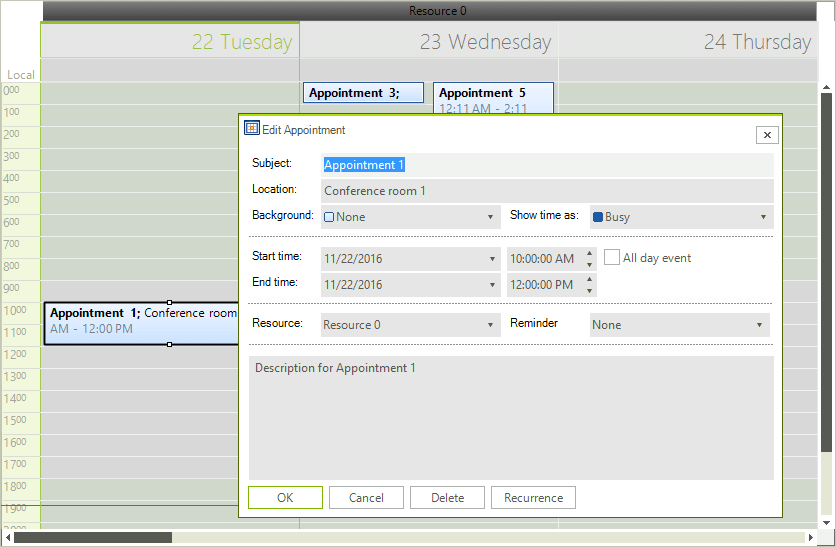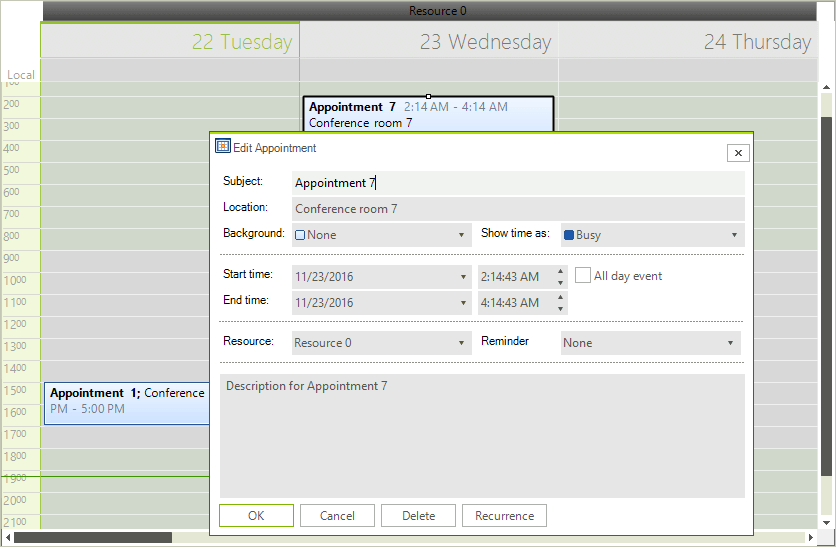Binding to Business Objects
What if your scheduling data originates from somewhere other than an easily accessible database? An API that accesses a legacy system or an email based system are two examples that might fit this description. RadScheduler allows binding to objects of any arbitrary structure.
Binding to objects follows the same basic pattern as binding to database tables. You must assign a collection of objects to an instance of SchedulerBindingDataSource. You also need to define mappings so that the appointment data expected in the scheduler (Start, End, Subject, etc.) is satisfied by specific properties in the bound objects.
The code below is an example appointment. Keep in mind that the particular construction of the CustomAppointment class and the names of its properties are arbitrary. The mappings will decide where properties are used. Notice that the object implements the INotifyPropertyChanged interface. Without this interface implementation the populated appointment object data will not show up in the scheduler.
Custom Appointment Class
public class CustomAppointment : INotifyPropertyChanged
{
private DateTime start = DateTime.Now;
private DateTime end = DateTime.Now;
private string subject = string.Empty;
private string description = string.Empty;
private string location = string.Empty;
private Guid id = Guid.NewGuid();
private List<CustomAppointment> exceptions;
public CustomAppointment()
{
}
public CustomAppointment(DateTime start, DateTime end, string subject, string description, string location)
{
this.start = start;
this.end = end;
this.subject = subject;
this.description = description;
this.location = location;
List<CustomAppointment> exceptions = new List<CustomAppointment>();
}
public List<CustomAppointment> Exceptions
{
get
{
return this.exceptions;
}
set
{
if (this.exceptions != value)
{
this.exceptions = value;
this.OnPropertyChanged("Exceptions");
}
}
}
public Guid Id
{
get
{
return this.id;
}
set
{
if (this.id != value)
{
this.id = value;
this.OnPropertyChanged("Id");
}
}
}
public DateTime Start
{
get
{
return this.start;
}
set
{
if (this.start != value)
{
this.start = value;
this.OnPropertyChanged("Start");
}
}
}
public DateTime End
{
get
{
return this.end;
}
set
{
if (this.end != value)
{
this.end = value;
this.OnPropertyChanged("End");
}
}
}
public string Subject
{
get
{
return this.subject;
}
set
{
if (this.subject != value)
{
this.subject = value;
this.OnPropertyChanged("Subject");
}
}
}
public string Description
{
get
{
return this.description;
}
set
{
if (this.description != value)
{
this.description = value;
this.OnPropertyChanged("Description");
}
}
}
public string Location
{
get
{
return this.location;
}
set
{
if (this.location != value)
{
this.location = value;
this.OnPropertyChanged("Location");
}
}
}
public event PropertyChangedEventHandler PropertyChanged;
protected virtual void OnPropertyChanged(string propertyName)
{
if (this.PropertyChanged != null)
{
this.PropertyChanged(this, new PropertyChangedEventArgs(propertyName));
}
}
Public Class CustomAppointment
Implements INotifyPropertyChanged
Private _start As Date = Date.Now
Private _end As Date = Date.Now
Private _subject As String = String.Empty
Private _description As String = String.Empty
Private _location As String = String.Empty
Private _id As Guid = Guid.NewGuid()
Private _exceptions As List(Of CustomAppointment)
Public Sub New()
End Sub
Public Sub New(ByVal start As Date, ByVal [end] As Date, ByVal subject As String, ByVal description As String, ByVal location As String)
Me._start = start
Me._end = [end]
Me._subject = subject
Me._description = description
Me._location = location
Dim _exceptions As New List(Of CustomAppointment)()
End Sub
Public Property Exceptions() As List(Of CustomAppointment)
Get
Return Me._exceptions
End Get
Set(ByVal value As List(Of CustomAppointment))
If Me._exceptions IsNot value Then
Me._exceptions = value
Me.OnPropertyChanged("Exceptions")
End If
End Set
End Property
Public Property Id() As Guid
Get
Return Me._id
End Get
Set(ByVal value As Guid)
If Me._id <> value Then
Me._id = value
Me.OnPropertyChanged("Id")
End If
End Set
End Property
Public Property Start() As Date
Get
Return Me._start
End Get
Set(ByVal value As Date)
If Me._start <> value Then
Me._start = value
Me.OnPropertyChanged("Start")
End If
End Set
End Property
Public Property [End]() As Date
Get
Return Me._end
End Get
Set(ByVal value As Date)
If Me._end <> value Then
Me._end = value
Me.OnPropertyChanged("End")
End If
End Set
End Property
Public Property Subject() As String
Get
Return Me._subject
End Get
Set(ByVal value As String)
If Me._subject <> value Then
Me._subject = value
Me.OnPropertyChanged("Subject")
End If
End Set
End Property
Public Property Description() As String
Get
Return Me._description
End Get
Set(ByVal value As String)
If Me._description <> value Then
Me._description = value
Me.OnPropertyChanged("Description")
End If
End Set
End Property
Public Property Location() As String
Get
Return Me._location
End Get
Set(ByVal value As String)
If Me._location <> value Then
Me._location = value
Me.OnPropertyChanged("Location")
End If
End Set
End Property
Public Event PropertyChanged As PropertyChangedEventHandler Implements INotifyPropertyChanged.PropertyChanged
Protected Overridable Sub OnPropertyChanged(ByVal propertyName As String)
If Me.PropertyChangedEvent IsNot Nothing Then
RaiseEvent PropertyChanged(Me, New PropertyChangedEventArgs(propertyName))
End If
End Sub
To use your custom object, create CustomAppointment instances and place them in a generic list before mapping and binding to the SchedulerBindingDataSource component.
Create Appointments
// create a list of CustomAppointment objects
BindingList<CustomAppointment> appointments = new BindingList<CustomAppointment>();
for (int i = 0; i < 10; i++)
{
// add every other appointment, populate with sample data
if ((i % 2) == 0)
{
int appointmentNumber = i + 1;
CustomAppointment myAppointment =
new CustomAppointment(
DateTime.Now.AddHours(appointmentNumber),
DateTime.Now.AddHours(appointmentNumber + 2),
"Appointment " + appointmentNumber.ToString(),
"Description for Appointment " + appointmentNumber.ToString(),
"Conference room " + appointmentNumber.ToString());
appointments.Add(myAppointment);
}
}
// create and configure a scheduler binding source
SchedulerBindingDataSource dataSource = new SchedulerBindingDataSource();
// map the MyAppointment properties to the scheduler
AppointmentMappingInfo appointmentMappingInfo = new AppointmentMappingInfo();
appointmentMappingInfo.Start = "Start";
appointmentMappingInfo.End = "End";
appointmentMappingInfo.Summary = "Subject";
appointmentMappingInfo.Description = "Description";
appointmentMappingInfo.Location = "Location";
appointmentMappingInfo.UniqueId = "Id";
appointmentMappingInfo.Exceptions = "Exceptions";
dataSource.EventProvider.Mapping = appointmentMappingInfo;
// assign the generic List of CustomAppointment as the EventProvider data source
dataSource.EventProvider.DataSource = appointments;
this.radScheduler1.DataSource = dataSource;
'create a list of CustomAppointment objects
Dim appointments As New BindingList(Of CustomAppointment)()
For i As Integer = 0 To 9
'add every other appointment, populate with sample data
If (i Mod 2) = 0 Then
Dim appointmentNumber As Integer = i + 1
Dim myAppointment As New CustomAppointment(DateTime.Now.AddHours(appointmentNumber), DateTime.Now.AddHours(appointmentNumber + 2), "Appointment " + appointmentNumber.ToString(), "Description for Appointment " + appointmentNumber.ToString(), "Conference room " + appointmentNumber.ToString())
appointments.Add(myAppointment)
End If
Next
'create_and_configure_a_scheduler_binding_source
Dim dataSource As New SchedulerBindingDataSource()
'map the MyAppointment properties to the scheduler
Dim appointmentMappingInfo As New AppointmentMappingInfo()
appointmentMappingInfo.Start = "Start"
appointmentMappingInfo.[End] = "End"
appointmentMappingInfo.Summary = "Subject"
appointmentMappingInfo.Description = "Description"
appointmentMappingInfo.Location = "Location"
appointmentMappingInfo.UniqueId = "Id"
appointmentMappingInfo.Exceptions = "Exceptions"
dataSource.EventProvider.Mapping = appointmentMappingInfo
'assign the generic List of CustomAppointment as the EventProvider data source
dataSource.EventProvider.DataSource = appointments
Me.radScheduler1.DataSource = dataSource
When you run the application, a series of CustomAppointment objects will show up in the scheduler.
Figure 1: Custom Appointments

Grouping by Resources
To use grouping by resource in this scenario, first you will need to create the business object that represents the resources:
Custom Resource Class
public class CustomResource : INotifyPropertyChanged
{
private int id;
private string name;
public int Id
{
get
{
return this.id;
}
set
{
if (this.id != value)
{
this.id = value;
this.OnPropertyChanged("Id");
}
}
}
public string Name
{
get
{
return this.name;
}
set
{
if (this.name != value)
{
this.name = value;
this.OnPropertyChanged("Name");
}
}
}
public event PropertyChangedEventHandler PropertyChanged;
protected virtual void OnPropertyChanged(string propertyName)
{
if (this.PropertyChanged != null)
{
this.PropertyChanged(this, new PropertyChangedEventArgs(propertyName));
}
}
}
Public Class CustomResource
Implements INotifyPropertyChanged
Private m_id As Integer
Private m_name As String
Public Property Id() As Integer
Get
Return Me.m_id
End Get
Set(value As Integer)
If Me.m_id <> value Then
Me.m_id = value
Me.OnPropertyChanged("Id")
End If
End Set
End Property
Public Property Name() As String
Get
Return Me.m_name
End Get
Set(value As String)
If Me.m_name <> value Then
Me.m_name = value
Me.OnPropertyChanged("Name")
End If
End Set
End Property
Public Event PropertyChanged As PropertyChangedEventHandler Implements INotifyPropertyChanged.PropertyChanged
Protected Overridable Sub OnPropertyChanged(propertyName As String)
RaiseEvent PropertyChanged(Me, New PropertyChangedEventArgs(propertyName))
End Sub
End Class
Now we need to bind the ResourceProvider of SchedulerBindingDataSource to a collection of CustomResource objects:
Bind Resource Provider
BindingList<CustomResource> resources = new BindingList<CustomResource>();
for (int i = 0; i < 5; i++)
{
CustomResource resource = new CustomResource();
resource.Id = i;
resource.Name = "Resource " + i;
resources.Add(resource);
}
ResourceMappingInfo resourceMappingInfo = new ResourceMappingInfo();
resourceMappingInfo.Name = "Name";
resourceMappingInfo.Id = "Id";
dataSource.ResourceProvider.Mapping = resourceMappingInfo;
dataSource.ResourceProvider.DataSource = resources;
Dim resources As New BindingList(Of CustomResource)()
For i As Integer = 0 To 4
Dim resource As New CustomResource()
resource.Id = i
resource.Name = "Resource " & i
resources.Add(resource)
Next
Dim resourceMappingInfo As New ResourceMappingInfo()
resourceMappingInfo.Name = "Name"
resourceMappingInfo.Id = "Id"
dataSource.ResourceProvider.Mapping = resourceMappingInfo
dataSource.ResourceProvider.DataSource = resources
Next we need to create the relation between appointments and resources. We can create either one-to-many relation or many-to-many relation. The following two sections cover each of these scenarios.
One-to-many Relation
To create a one-to-many relation between appointments and resources we need to add a property of type EventId to the business object that represents an appointment:
Define One-to-many Relation
//other fields…
private EventId resourceId;
//other properties…
public EventId ResourceId
{
get
{
return this.resourceId;
}
set
{
if (this.resourceId != value)
{
this.resourceId = value;
this.OnPropertyChanged("ResourceId");
}
}
}
'other fields…
Private _resourceId As EventId
'other properties…
Public Property ResourceId() As EventId
Get
Return Me._resourceId
End Get
Set(value As EventId)
If Not Object.Equals(Me._resourceId, value) Then
Me._resourceId = value
Me.OnPropertyChanged("ResourceId")
End If
End Set
End Property
To map the new property, add the following setting to your AppointmentMappingInfo instance:
appointmentMappingInfo.ResourceId = "ResourceId";
appointmentMappingInfo.ResourceId = "ResourceId"
In this scenario you should not set the Resources property of the AppointmentMappingInfo
Set Resource
CustomAppointment myAppointment =
new CustomAppointment(
DateTime.Now.AddHours(appointmentNumber),
DateTime.Now.AddHours(appointmentNumber + 2),
"Appointment " + appointmentNumber.ToString(),
"Description for Appointment " + appointmentNumber.ToString(),
"Conference room " + appointmentNumber.ToString());
appointments.Add(myAppointment);
//set the resource id
myAppointment.ResourceId = new EventId(i % 2);
Dim myAppointment As New CustomAppointment(DateTime.Now.AddHours(appointmentNumber), DateTime.Now.AddHours(appointmentNumber + 2), "Appointment " + appointmentNumber.ToString(), "Description for Appointment " + appointmentNumber.ToString(), "Conference room " + appointmentNumber.ToString())
appointments.Add(myAppointment)
'set the resource id
To test this scenario, assign each appointment with a ResourceId and enable grouping by setting RadScheduler’s GroupType property:
Group By Resource
this.radScheduler1.GroupType = GroupType.Resource;
Me.radScheduler1.GroupType = GroupType.Resource
Figure 2: One-to-Many Relation

Many-to-many Relation
This scenario can be implemented similarly to the previous one. Instead of the ResourceId property, we should add a Resources property which represents a collection of EventId objects:
Define Many-to-many Relation
//other fields…
private List<EventId> resources = new List<EventId>();
//other properties…
public List<EventId> Resources
{
get
{
return this.resources;
}
set
{
if (this.resources != value)
{
this.resources = value;
this.OnPropertyChanged("Resources");
}
}
}
'other fields…
Private _resources As New List(Of EventId)
'other properties…
Public Property Resources() As List(Of EventId)
Get
Return Me._resources
End Get
Set(value As List(Of EventId))
If Not Me._resources.Equals(value) Then
Me._resources = value
Me.OnPropertyChanged("Resources")
End If
End Set
End Property
In the AppointmentMappingInfo settings the ResourceId property should be left unset and the Resources property should be set with the name of the collection:
Set Resources
appointmentMappingInfo.Resources = "Resources";
appointmentMappingInfo.Resources = "Resources"
Now we can add a resource to an appointment by adding its id in the Resources collection of our business objects:
myAppointment.Resources.Add(new EventId(resources[i%3].Id));
myAppointment.Resources.Add(New EventId(resources(i Mod 3).Id))
Figure 3: Many-to-Many Relation
